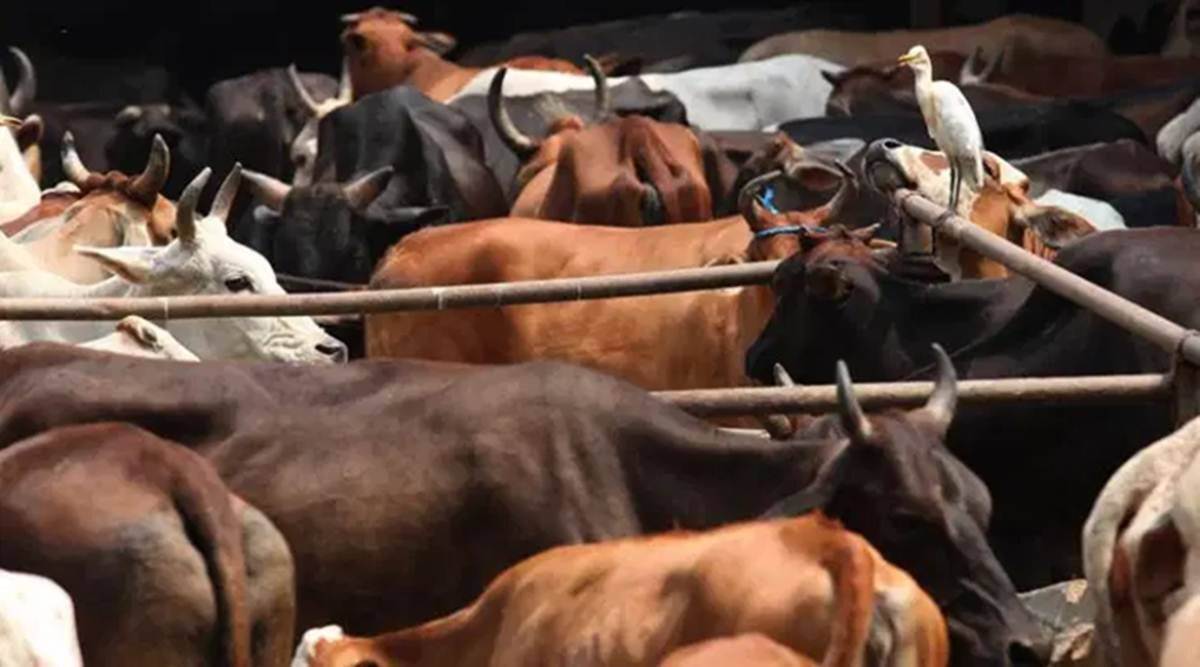 Over the the past 72 hours, with the state already starting to feel shortage of beef, the Goa government has come under growing administrative and political pressure to facilitate meat to a tourist state gearing for Christmas and New Year celebrations.
Over the the past 72 hours, with the state already starting to feel shortage of beef, the Goa government has come under growing administrative and political pressure to facilitate meat to a tourist state gearing for Christmas and New Year celebrations.WITH THE BJP government in Karnataka proposing a more stringent law on banning cattle slaughter, the Pramod Sawant-led Goa administration on Wednesday convened a meeting between cattle suppliers from Karnataka and meat traders of Goa to look for a legal channel for safe passage of livestock to the state.
With Maharashtra passing the anti-cattle slaughter act four years ago, Goa relies solely on Karnataka for bulk of its beef consumption — supplied either through transport of live buffalo and bull or carcass from the neighbouring state’s abattoirs.
Over the the past 72 hours, with the state already starting to feel shortage of beef, the Goa government has come under growing administrative and political pressure to facilitate meat to a tourist state gearing for Christmas and New Year celebrations. The urgency of the situation can be gauged by Chief Minister Sawant’s public assurances that he has a “duty to look after the 30 per cent minority population”.
After the meeting with officials of the animal husbandry department on Wednesday, the meat traders in a statement said the government assured them all help to them to overcome the beef shortage arising out of the Karnataka legislation plan.
The beef trade in Goa is divided between fresh meat and frozen meat, with the former headed by Quraishi Meat Traders Association and the latter by Cold Meat Storage Association.
Complex compounds problem for trade
Adding to the troubles of Goa beef trade is the Goa Meat Complex, which remains shut for long period of time. The complex, which under Goa’s anti-slaughter laws allows for bovines other than cow, has been shut for four years, according to the Quraishi Meat Traders Association. “They open it Eid to Eid, so it was last open in August,” says association president Manna Bepari. “We legally have permission to get live animals from Karnakata and give them to Goa Meat Complex. But now with the complex shut we do not have any such option. It is further risky to get animals if Karnataka passes the Act.”
While the Quraishi Meat Traders Association says the Karnataka Bill will be last nail in the coffin for them, the Cold Storage Association is now looking at an old channel to expand supply — meat export houses in Delhi.
Cold storage Association president Vernon Lobo says the situation is now dire as under the new Bill. “One cannot even transport bovines from one district to another. Even the farmers who want to transport bull and buffaloes will face a tough time. The powers are now available right till the rank of a sub-inspector to raid and arrest. Chances of getting beef from Karnataka is zero,” he says.
With Rajdhani Express and Mangala Express bringing in two tonnes of beef tongue and undercuts and tenderloin daily from Delhi over the past few years, Lobo says the math around volumes will now change. “Now, we have to fully rely on export houses of Saharanpur in New Delhi. Earlier, they would only direct the undercuts and tongue to Goa market. Now we will have to go for deboned beef chunks entirely from New Delhi as without Karnataka our supply is affected 100 per cent,” Lobo says. This would mean a domestic market now looking to get a share of the export volumes.
The cold storages in Goa stock a tonne at any given time, with the trade looking at minimum 8 tonne of beef daily for Goan locals.
“We did look at other avenues. Kerala doesn’t have that kind of supply as they too are dependent on Tamil Nadu. Further, no other south state has abattoir facilities like Karnataka. Tamil Nadu transport economics is working to be expensive,” he says. “We still need to see how the next few weeks shape as any delay in trains will affect supplies.”
Quraishi Meat Traders Association president Manna Bepari says unlike frozen meat, the fresh meat traders cannot have fresh meat traveling for beyond three hours. “This rules out any other state for us, as Karnataka was the only viable one,” he says.
Every day, Bepari’s association gets 15 tonnes of fresh meat in five trucks, which are then routed to five municipal markets in Panjim and Mapusa in north Goa and Ponda, Vasco and Margao in south Goa.
Cruz Cardoza, president of Shack Association in Goa, says the pinch was felt immediately. “Last week, tourists didn’t have steaks… This will have an impact on tourism. Further, the pork segment will feel the pressure now.”